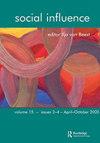Change resistance moderates existence and longevity biases
IF 0.6
3区 心理学
Q3 PSYCHOLOGY, SOCIAL
引用次数: 6
Abstract
Abstract Evidence has been found for existence and longevity biases—inferences of goodness from prevalence or longevity. We argue these biases actually emerge among change-resisting individuals. Our evidence suggests change-accepting individuals can even demonstrate a reversal of these biases. In two studies, change-resisting individuals’ attitudes were suggestive of existence and longevity biases while change-accepting individuals significantly reversed this pattern by evaluating long-standing or prevalent objects less favorably. Finally, we reanalyzed data from the existence and longevity biases literature previously reported in Social Influence. We found Americans identifying as more Republican—thus theorized as more change-resisting—were those who favored a long-standing practice. Altogether, we argue that existence and longevity biases emerge depending on individuals’ change resistance, indicating an important theoretical expansion.变化抵抗调节存在和寿命偏差
存在和长寿偏差的证据已经被发现——从流行或长寿来推断善良。我们认为这些偏见实际上出现在抗拒改变的个体中。我们的证据表明,接受改变的人甚至可以证明这些偏见的逆转。在两项研究中,抗拒改变的个体的态度暗示了存在和长寿偏见,而接受改变的个体则通过不那么积极地评价长期存在或普遍存在的事物而显著地扭转了这种模式。最后,我们重新分析了先前在《社会影响》中报道的存在和寿命偏差文献中的数据。我们发现,认为自己更倾向于共和党的美国人——因此被理论化为更抵制变革——是那些支持长期做法的人。总之,我们认为存在和长寿偏差的出现取决于个体的变化抵抗,这表明了一个重要的理论扩展。
本文章由计算机程序翻译,如有差异,请以英文原文为准。
求助全文
约1分钟内获得全文
求助全文
来源期刊

Social Influence
PSYCHOLOGY, SOCIAL-
CiteScore
1.50
自引率
0.00%
发文量
4
期刊介绍:
Social Influence is a journal that provides an integrated focus for research into this important, dynamic, and multi-disciplinary field. Topics covered include: conformity, norms, social influence tactics such as norm of reciprocity, authority, scarcity, interpersonal influence, persuasion, power, advertising, mass media effects, political persuasion, propaganda, comparative influence, compliance, minority influence, influence in groups, cultic influence, social movements, social contagions, rumors, resistance to influence, influence across cultures, and the history of influence research.
 求助内容:
求助内容: 应助结果提醒方式:
应助结果提醒方式:


